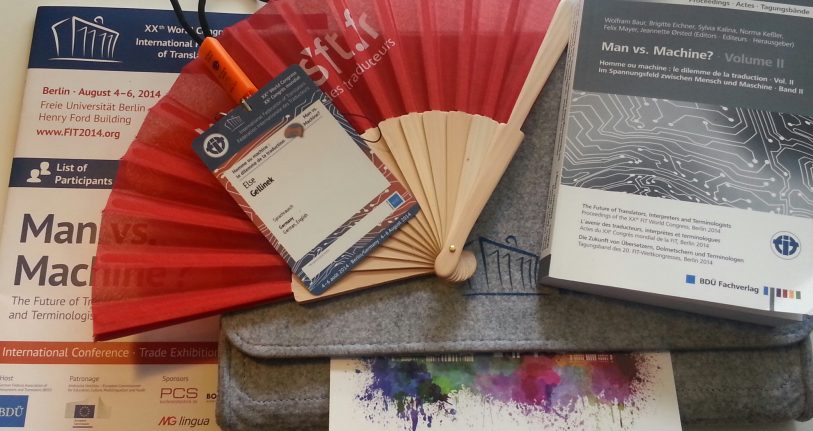Man vs. Machine? A Conference Write-up
Else Gellinek
- August 14, 2014
- 9 min read
- Continuing education

The FIT XXth World Congress in Berlin
The 3-day whirlwind that was the FIT XXth World Congress in Berlin is now over. 1,600 attendees from all over the world met up from August 4 to 6 to discuss developments in the translation industry.
The basics
First of all, I had a wonderful time and met quite a few people I only knew from Twitter or other networks. If you think translators are fun on Twitter, you should come see us in real life!
The conference was well organized and everyone generally agrees that the BDÜ did the thorough and exact job that everyone expects of Germans. The conference assistants taking care of registration, passing around the mics during sessions, and seeing to all of our other needs were also unfailingly friendly and charming.
Berlin went into summer overdrive during the conference. The sweltering heat in the lecture halls made it hard to think at times. One of those rare goodies actually worth having were the little red fans being distributed by the French translator association SFT. They were a common sight at all sessions. I really appreciated mine on the trip back home when I got stuck on a train with no air-conditioning and windows that wouldn’t open.
Beverages, small snacks, and lunch were all available outside. And it was always busy there due to the warm weather. The BDÜ set up easily visible beach flags to mark networking points, so you knew where to go to meet translators with certain language combinations and specializations. And it was a great idea. I never actually made it to any of the networking sessions, which is a shame. But, while caught up in conversation somewhere else, I could spot everyone I was missing gathered around the beach flag where I had originally been headed. These designated areas certainly helped structure the otherwise overwhelming crowds.
A minor complaint is that the writing on the conference name tags was just so small. That made it impossible to sneakily check people’s information. Then again, leaning in really close to read people’s names did on occasion break the ice and lead to nice chats. I would also have wished that the option of adding social media handles to our badges had been more widely publicized. I missed the badge editing deadline as did quite a few other conference-goers, leaving us all with a sad little blank area on our name tags.
My favorite sessions
As is always the case, not all sessions were created equal. What a lovely realization when you are trapped in a smallish room, sandwiched in the middle row, with no way of politely fleeing the scene. A big thank you to all the people on Twitter tweeting away from your more interesting sessions: You helped me pass the time.
Anyway, let’s have a quick look at presentations I particularly liked.
Chris Durban, Working the room
I began my conference with Chris Durban who definitely knows what she’s talking about. Boy, did she work that room! I’ve read Chris’ book and was familiar with the topic of her talk, but she’s an engaging and witty speaker and I enjoyed every minute. Her tough-love message, in a nutshell, is that translators need to act, dress, and speak like real professionals – essentially we should BE professionals. And then we will be treated as such. It’s a strong message and it was well delivered.
Susanne Schmidt-Wussow, Marketing for literary translators
I joined Susanne’s workshop mainly because I enjoy her tweets so much (@frenja). And she is is just as knowledgeable and likable in person as she is on Twitter. Everything she said can be applied to other specializations as well.
Yes, putting yourself out there in a competitive market is hard and many have failed. That doesn’t mean you should just give up and go home. Invest time and effort in careful research and prepare yourself well. And then dare to do something new and stand out from the competition. Or simply have the courage to test a personalized approach at book fairs or trade shows. Just don’t let others keep you from trying things out!
Maureen Ehrensberger-Dow and Gary Massey, Translators and machines: working together
Ehrensberger-Dow and Massey are researchers at the Institute of Translation and Interpretation at the Zurich University of Applied Sciences. They presented findings from their Cognitive and Physical Ergonomics of Translation project, which studies the impact of translation technology on translators’ thought processes and workflows. It should come as no surprise that CAT tools do not always seem well-tailored to actually being used by humans. While they can provide gains in productivity and consistency, their shortcomings can constrain how we work, causing delays or frustration. Working at a computer for long periods of time also affects translators. The physical ergonomics of translation technology includes issues like workplace set-ups, user interfaces, or simply screen sizes. Translation technology has a strong influence on our workflows and our health and I hope that the recommendations resulting from this research will be put into practice by software vendors and freelance translators.
Ehrensberger-Dow and Massey are still collecting data for the next phase of their project. You can and should take part in their Ergonomics at the translator’s workplace online survey and do your bit for improving our knowledge of workplace processes and health-related issues. The survey is available in 6 languages and will be open until the end of 2014. Plenty of time to have your say. You can also have them send you the results of the survey if you want to know what others said. Send an email to the project team at ergotrans.iued@zhaw.ch. (Edit March 2022: This survey has long closed and the results were published.)
What about machine translation (MT)?
So, Man vs. Machine? The Future of Translators, Interpreters and Terminologists was the grand topic of the conference. I am not so sure that everyone came to the convention with an open mind. Machine translation is a strangely emotional issue and elicits strong reactions. The common sentiment during most discussions, which I also heard from the audience at the round table Machine translation – Blessing, Curse or Something in Between is that MT remains a sinister technology. Post-editing jobs are to be avoided at all costs!
While I understand a knee-jerk reaction to MT as a symptom of anxiety about our future, I was hoping that I would find more objective conversations. Setting the fear-mongering aside, where is people’s curiosity to learn more about MT technologies? Or does everyone except me already know all there is to know? I don’t feel that I am well enough informed to have a definite opinion on MT yet. The papers in the conference proceedings (yep, I am actually reading them) are really interesting and provide much more information on MT applications in real life than I heard in the sessions and during conversations with other translators. Perhaps I could have chosen more suitable sessions to attend.
I would have enjoyed meeting real live happy post-editors willing to share something about their work and why they do what they do. In the book Diversification in the Language Industry, I read an interview with Tineke van Beukering, who has been post-editing MT since 2009 and she doesn’t seem unhappy with her career. There must be some other post-editors out there. Even better, I would have liked to see software vendors at the congress demonstrating a post-editing interface up close. Or did I just not see them there?
It seems that there weren’t (m)any translators at the convention actively involved in post-editing MT or willing to do it. I met one rather discouraged lady from a small translation agency who had been tasked with finding some translators for post-editing jobs. Our encounter took place on the last day of the conference and there hadn’t been a single taker so far.
Was it worth it?
This was my first big translation conference so I have no real basis for comparison. More seasoned conference attendees may suffer from a been-there-done-that ennui, but not me. Being a fresh-faced newcomer to the conference scene, I mainly feel quite excited to have been part of such a large professional gathering.
Do I wish that I had learned more from the sessions? Yes, probably. However, I learned so much during chats with colleagues that I don’t feel that I returned home empty-handed. There were so many topics covered at the FIT Congress that deciding to attend one session meant choosing to not hear something about other, equally interesting topics. And that’s OK. The conference proceedings will catch me up on sessions I missed. What’s more, now I know which speakers to look out for at future conferences. And there definitely will be other conferences.
Other takes on the FIT Congress
The sheer amount of sessions, networking opportunities, and conversations going on means that my impression covers a mere fraction of the happenings in Berlin. For instance, the resolution passed by the FIT calling upon governments to do more to safeguard interpreters working in war zones was something that I completely missed.
What’s more, everyone comes to conferences with different expectations, leading to different conclusions. So, let’s hear what other attendees picked up on.
Blogs (all in German so far):
Susanne Schmidt-Wussow: Du warst auf dem FIT Congress? Wie war’s denn?
Miriam Neidhardt: FIT-Kongress
ADÜ Nord: ADÜ Nord mit eigenem Auftritt beim FIT Weltkongress in Berlin mehr als zufrieden
B’s Beo Blog: Babylon in Berlin – 20. FIT-Weltkongress
Twitter
#FitCongress was the official Twitter hashtag. There are quite a few different Twitter mashups circulating, such as
This one by the BDÜ (Edit Feb. 17, 2022: Link no longer live)
This one on tagboard (Edit March 2022: No longer live)
Alexander Drechsel: Looking back at the #FITcongress
Did you attend the FIT Congress? What did you think of it?
PS One thing I won’t miss is that constant ripping velcro sound of people opening their conference bags. Add that to the coming and going during the presentations and you have quite a few disruptions.



[…] experience Happy Birthday to The Savvy Newcomer! How can we add value with our websites? Man vs. machine? A conference write-up Professional jealousy and the interpreter Globalization drives translator boom Pricing Strategies […]
[…] war tatsächlich auch in aller Munde. Auf der 2014 FIT-Konferenz in Berlin hatte hierzu eher Ablehnung und Misstrauen geherrscht. Dieses Jahr in Bonn war der Tenor eher, dass […]